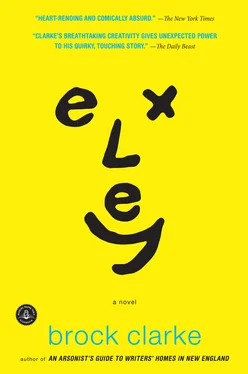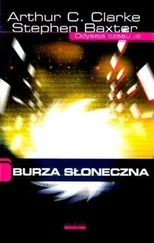“But.,” I begin to argue, when the phone at the front desk rings. To answer it, the receptionist swivels in her chair, so that her back is to me. In front of me is a pair of swinging doors. According to M., his father is in room D-1, just past those doors. I sneak another look at the receptionist; she is still talking on the phone and her back is still to me. I wipe my perspiring hands on my dungarees. You must not , I say to myself. Yes, you must , Dr. Pahnee says back. And then before I can talk myself out of it, I run through the doors, past the usual hospital apparatuses — vending machines, X-ray machines, and the like — until I come to room D-1. I push the door open and walk inside. The room is curtained and gloomy; the only light (dim) emanates from a wall fixture above the patient’s bed. Yes: there is a bed, and there is a patient in it. I walk closer. He is as M. has described him: pale, clean shaven, with a crew cut. He is, as M. claimed, hooked up to a number of machines, and they are all connected to one another and to the patient in mysterious ways. Before I became a mental health professional, I briefly considered becoming a physician. But the sick body requires too many complicated machines to heal it. Besides, the machine of the juvenile mind is complicated enough. I take another step forward. I am on the patient’s right side. His right wrist is bare and resting on top of his left hand, both of his hands resting on top of his stomach. I can see a white bracelet on the patient’s left wrist, a bracelet on which, no doubt, is information pertaining to the patient’s identity — his identity and, indeed, information that will help me identify him . I am reaching over to lift his right wrist off his left when someone yells, “What do you think you’re doing?” I turn my head and see two men in green military uniforms. I almost revert to myself, grovel, offer my apologies, beg their forgiveness, and slink out of the room. But being Dr. Pahnee has gotten me this far. which is why I exclaim what M. has instructed me to exclaim at the end of each session: “ ‘I’ve got human life — do you understand that? Human life! — in my hands!’ ”
My words sound impressive to my own ears, but they seem to have the opposite effect on the guards. They step forward, each grab me by the elbow, drag me out of the patient’s room, back through the swinging doors, past the receptionist, through the automatic door, and then deposit — deposit and, indeed, dump — me on the sidewalk outside.
Outside the Crystal
After advanced reading I had study hall, math, and social studies (I was an advanced eighth-grade reader, but a normal eighth grader in every other subject). Then it was lunch. I got in line in the cafeteria with my tray. I got my little carton of milk, my thing of pears swimming in syrup, my two slices of white bread with gravy and chunks of meat on top. I pushed my tray on the metal track toward the cashier. As I did, I looked to the right, toward the cafeteria tables, and saw Harold. He was sitting by himself. There were plenty of reasons why. Harold whinnied instead of laughing, and always at things that weren’t funny. He had never made it even halfway up the rope in gym class. He had a long, skinny neck, and that long, skinny neck housed a huge Adam’s apple. Probably the biggest ever. Probably even bigger than Adam’s, whose apple must have been really big, since it was named after him. And Harold had terrible raisin allergies. He might have been the only person in the world allergic to raisins. I don’t know what else I can say about him except that I was the only person who ever sat with him at lunch. But I just didn’t want to be that person right then. Not when my dad was in the hospital, waiting for me to bring Exley to him. So I left my tray there on the track and walked in the other direction. “Hey, you can’t do that,” the cashier said. But I did. I left the tray there and ran: away from Harold, the cafeteria, the school, until I was running down Washington Street, toward the Crystal.
Washington Street looked completely different than it had the day before. The buildings and the people were still there. But after reading A Fan’s Notes , Washington Street was a different Washington Street. Exley described driving down Washington Street on the way to the hospital when he thought he was having a heart attack. In the chapter, the leaves were turning color and falling, and Exley said that “Washington Street was as lovely as I had ever seen it” and that it “looked like some dream of a place.” He also said he hated the place, but the writing itself said he didn’t. Sometimes how you say things matters more than what you say. And now that I’d read Exley, I could see how pretty Washington Street really was. The leaves had already fallen and had been raked into neat piles along the side of the street. Most of the snow from the night before had melted, but there was a little bit left on top of the piles. It looked like frosting. The trees were bare, their branches waving happily in the wind. I had never seen the sky so deep blue. The sun was so bright that it was everywhere; it seemed to be bouncing back and forth from one hospital’s windows to the others’. But I wouldn’t have noticed all this without Exley’s book. As I walked by the VA hospital, I remembered the time when me and my dad and Mother drove down Washington Street. It was fall then, too. The cigarette smokers were outside the YMCA, the fat women were in a slightly shorter line outside the welfare office, the soldiers were on their cell phones. The trees were bare. The sky was blue then, too, but Mother didn’t seem to notice it. All she noticed was some guy walking around and around the Public Square. We were stopped at a red light. The guy was wearing sweatpants with one sweatpant leg pushed up to the knee, and old cracked leather basketball sneakers without any laces. He walked bent over at the waist, looking at the ground, like he was going to get sick. But he didn’t get sick. He just kept walking like that, around and around the Square. I don’t know where he thought he was walking. It didn’t look like he was out there for the exercise.
Finally, just when the light turned green, the guy stopped — right in the middle of the intersection. He reached down and picked a cigarette butt up off the street and put it between his lips. I could see the little twisted, burnt nub of it sticking out. Then he started patting himself down, turning his sweatpant pockets inside out. He was still in the middle of the street. Mother reached over to the steering wheel and beeped at the guy. He glared at us and for a second I was scared. I pictured him whipping off one of his sneakers and beating our car with it. I figured maybe that’s why he wore them without laces.
Anyway, he didn’t do that. The guy tipped his imaginary hat at us and then kept walking, around and around the Square, as we drove on.
“It’s so depressing,” Mother said.
“It’s not so bad,” my dad said. He said that because he’d read Exley. I didn’t know if Mother had read Exley or not, but if she had, she’d read him wrong. I knew that now. This was how my plan would work; I knew that once I found Exley, he would make my dad feel better, because his book already had.
LIKE I SAID earlier, the Crystal was my dad’s favorite place in Watertown. And it was my dad’s favorite place because it was one of Exley’s. I knew that after reading his book. According to his book, Exley went to the Crystal on Sunday, and only on Sunday. But I didn’t think I could wait a whole six days to look for him there, and I didn’t think my dad could wait that long, either. I know it’s Monday , I told Exley in my head. But please be at the Crystal .
Читать дальше












